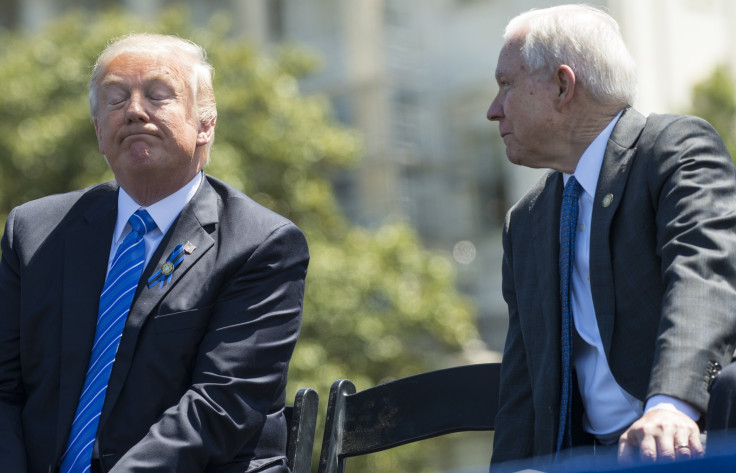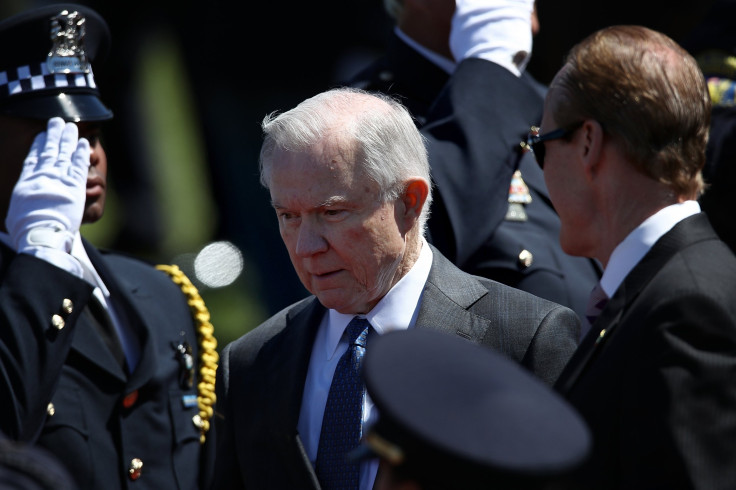Jeff Sessions Wanted To Resign After Trump Criticized Him, But President Said No

Update: 1:10 a.m. EDT-
While reports surfaced, Tuesday claiming that Attorney General Jeff Sessions had offered to resign, following the growing rift between him and President Donald Trump, most of them failed to reveal exactly when the alleged idea of resignation was brought up.
However, a new report by Politico claims that Sessions had floated the idea of resignation in late May, days before Trump’s scheduled international tour of the Middle East, according to a close confidant of the attorney general.
The anonymous confidant also added that Sessions had chosen to resign out of obligation because he did not want to continue working in the Trump administration after recusing himself from FBI’s Russian investigation, which had incurred the president’s ire.
Original Story:
Attorney General Jeff Sessions had offered to resign from his post, following the increasing tension between him and President Donald Trump, according to latest reports. Though it is unclear what drove Sessions to take this step, his resignation plea was immediately turned down by Trump, stating that while he might not agree with the attorney general’s actions, he still had enough faith in him to keep him in his administration, according to the Chicago Tribune.
Even though Sessions was handpicked by Trump, the former drew the president’s ire when he decided to recuse himself from FBI’s investigation into Russia's involvement in the 2016 election, shortly after he was appointed the attorney general.

Moreover, Sessions did not meet with Trump to discuss his recusal before taking the decision. The president got to know Sessions' decision only minutes before he was set to announce it to the press, it was reported.
Sessions' decision to recuse himself from his post was based on a Washington Post report that revealed Sessions had met with Russian Ambassador Sergey Kislyak during Trump’s presidential campaign and how he neglected to mention that fact during the Senate Judiciary Committee’s January confirmation hearing.
Trump’s lingering anger on Sessions deepened when a special counsel, spearheaded by Robert Mueller, was formed following Sessions’ recusal, to oversee the probe into possible collusion between Russian officials and members of the president’s administration. According to the New York Times, Trump blamed Sessions for the involvement of Mueller in the Russian investigation.
Trump also lashed out at the Department of Justice (DOJ) through a tweet Monday where he expressed his frustration over the “watered down” version of the travel ban that has been presented for approval before the Supreme Court. Even though Trump did not take Sessions’ name directly, it is a known fact that attorney general has been the biggest advocate of the revised travel ban after the original concept of the travel ban was struck down by the smaller courts.
Trump went on to tweet that the people of America need a “tougher” version of the travel ban and not the “politically correct” version drawn up by the DOJ.
Despite multiple reports claiming that Sessions had floated the idea of quitting, he will not be stepping down from his post, CNN senior White House correspondent Jim Acosta recently tweeted.
Sessions is not stepping down, a DOJ spokeswoman says.
— Jim Acosta (@Acosta) June 7, 2017
Meanwhile, White House Press Secretary Sean Spicer refused to give out any details regarding Sessions’ growing rift with Trump during White House press briefing, Tuesday when CBS Chief White House Correspondent Major Garrett asked him about the same. "I have not had a discussion with him about that," Spicer said, CBS News reported.
If Sessions was to resign, it would be a big blow for Trump’s administration since the president and the attorney general share many common views including crime and immigration. He was also the first among the Republican candidates to endorse Trump during his campaigning days when most others from his own party were reluctant to support him.
© Copyright IBTimes 2024. All rights reserved.






















